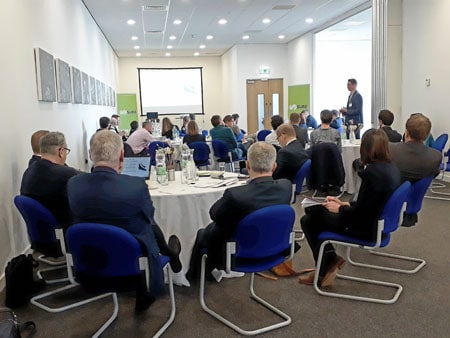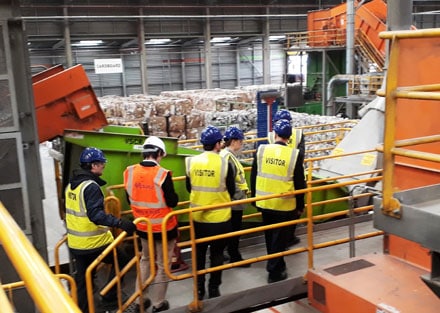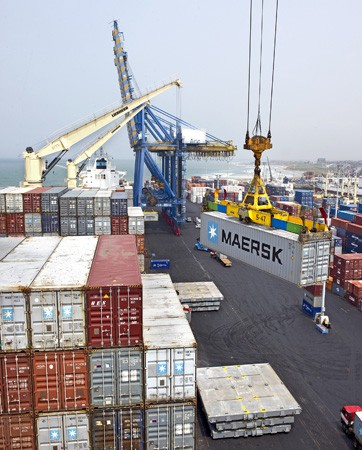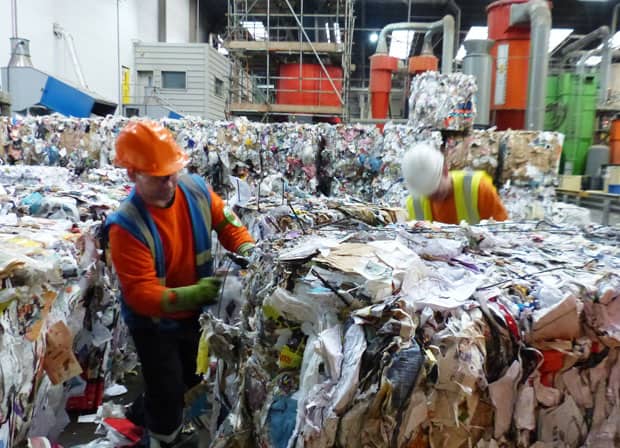It has been a turbulent few months for the UK (and global) recycling sector, with the significant impacts of National Sword legislation in China effectively reshaping the landscape of global recovered material trading.
Although the new material quality import restrictions came into force in China on the 1 March 2018, operators like SUEZ were actively considering their end markets, contract priorities and materials facility operations many months in advance, with SUEZ stopping any direct export to China as far back as April 2017. However, just because we were aware of the impending pain heading towards our sector, we had less comfort about the level of awareness within our public sector clients (current, former and target) about the potential short term and longer term implications, so in February 2018 we hosted a workshop at our Severnside Energy Recover Centre to deal with some of these issues head on.

Workshop
The intention was to bring together members of the SUEZ management team, in particular those who deal with market risks daily in terms of commodity trading, local authority contracts and MRF operations with representatives from most of the major waste and resource management consultancies (and WRAP), who have a holistic and integrated view of the sector and act as advisors to authorities across the UK and a number of representatives from local authority bodies including ADEPT and NAWDO, who are on the forefront of collecting the materials now under threat from changes in global markets.
After some in depth presentations from a the SUEZ experts, some rather astute questions from the 30 delegates, and some open debate on risks, markets, quality and responsibility, the group were taken on a tour of our Avonmouth MRF to see how the site, and the staff, were reacting to the need for better quality.
This paper summarises the 5 key messages which crystallised from discussions at the event:
The market is changing substantially…
The global commodity markets are somewhat in disarray, with mixed paper prices having fallen by 60% since May 2017, following China’s National Sword policy and its subsequent enforcement. The global material flow map will continue to morph and adapt for some time to come, although we do expect things to settle down in the next 12 to 18 months as new markets are secured and supporting infrastructure developed. However, the scale of change is unprecedented, and only two years ago more than 50% of global recyclables were going to China (almost 60% from the UK), whilst today they are taking no post-consumer plastics and no mixed paper.
It’s quite shocking to consider how quickly this dramatic change come about. One of the experts presenting, Olivier Thomas (CEO of SUEZ Trading), provided a recap of the short history of the National Sword initiative with February 2017 being the start of the new policy regime when China initially strengthened its controls on imports. A formal announcement was made to the World Trade Organisation in July 2017 banning 24 recycled materials products, which was subsequently strengthened by a detailed product list in November 2017, which would come into force on the 1st March 2018. So, in just over a year, the Chinese policy machine changed the global recycling landscape completely.
Compared to policy development cycles in Europe (and in particular the UK), this is quite incredible and the ripple effects are continuing to reshape the landscape. Olivier Thomas conceded that in the case of paper it is almost impossible to meet China’s new purity targets from any European source, and so SUEZ are no longer gambling on sending materials to China and have been investing time and effort in securing European outlets wherever possible.
Real risks
The immediate impact has seen mixed paper and OCC (old corrugated cardboard) prices collapse. The fear is that waste management companies will start to store these materials rather than ship them overseas, hoping for an upturn in markets, but the inclement weather will reduce the quality of the bales and result in them being worthless very quickly. When this happens the only real outlets will be to landfill them or to burn them to recover energy – and this poses deep questions for the UK waste & recycling sector, and our European counterparts.

With so much material potentially in limbo, awaiting new and improved capacity, the European waste sector is seeing an injection of burnable material into EfW – the low grade recycling which would have previously been exported. In time landfill will become increasingly attractive, and some operators are considering reopening mothballed landfills for contingency capacity — something unthinkable five years ago. This unintended consequence is certainly concerning policy makers, customers and contractors, and is making plenty of media headlines. This is not something that SUEZ intends to happen, but the market pressure is building on contractors of all shapes and sizes.
Where contracts are driven by price, landfilling material collected as recyclables suddenly becomes an acceptable option, even if it isn’t in the spirt of the law. Whilst the majority of UK municipal contracts are still driven by diversion and sustainability goals, ensuring that end markets will be sought within reason, but the risk of handling these low value materials will drive plenty of supply chain discussions between contractor and their client’s regarding feedstock quality and suitability.
In parallel, other national minimisation and diversion legislation, including programmes in the Netherlands and Germany, are complicating the picture, forcing up domestic plastics and paper collections and limiting plastics going to EfW etc. These will ultimately increase recyclable materials on the global market at a time when capacity is significantly reduced.

The risks are real, tangible, and already in play. Falling prices, shifting capacities, and unintended consequences are becoming the new norm, and UK customers and operators must adapt to this as they renegotiate their contracts, set their targets and go out to market etc.
Mitigating against short term risks – Quality!
Recognising these significant risks, it is important to consider them in their temporal context. Having established the National Sword in roughly 12 months, the Chinese policy machine could reverse or adjust it just as rapidly. Olivier Thomas believes that it is likely that China will correct the contamination limits for paper upwards to 1.5% in the next year or two, but probably won’t adjust plastics and mixed materials limits.
In the short term, some recycling contracts will be breached and some European sorting capacity will need upgrading. Much of the mixed plastic and paper previously exported will stay in Europe for treatment.
Few will argue with that National Sword is the biggest shake up the market has seen in quite a while, and for the next year or two the supply chain will look very unfamiliar. But be assured, this is a short term situation – there is capacity coming online across Europe, in particular in rapidly developing economies like Turkey, plus of course India and SE Asia, and China will be progressively adapting and reverting some of the restrictions as they assess how much of their materials demand can be secured from domestic sources.
But for the present, mitigating price and capacity risks starts directly in the bin, in effectively managing DMR (dry material recycling) quality.
As Europe adapts, it will be establishing new (and developing existing) markets. Reprocessors in Europe will be changing their intake specifications to include more packaging materials (which historically would have gone to China). But their quality demands will need to be high, forcing MRFs to adapt to changing market demands, and as such manual sorting will become an important mitigating tool in managing quality outputs from MRFs across Europe, driving processing price differences of 20-40 euros per tonne.
Quality standards
A modern, state-of-the-art municipal MRF, like the SUEZ Avonmouth facility, is designed to achieve quality standards not too far off the most stringent National Sword limits (99% quality output is the target). But a MRF is designed to sort materials, not transform them, and James Pike, SUEZ’s Regional Director for the South West, is concerned that MRF customers often fail to understand the limitations of the process.

MRFs cannot convert waste material to product, but they can extract non-target materials and remove contamination, but at a cost, as this deflects the machines and staff away from positively separating the quality materials that end markets are demanding.
Market demands
So more the more non target materials and contamination that a site has to deal with the lower the output material quality, the bigger the cost and the higher the risk of end markets not being secured. Overlay this with dealing with the problem of sorting wet fibres, the need to protect staff from potential exposure to hazardous waste (which shouldn’t be in the feedstock) and meeting changing end market demands and the reality is tough!
It is impossible to achieve 90% material recovery from feedstock with 30% contamination, but that doesn’t make the discussions with our clients any easier in the current climate. Operators like SUEZ need waste producers and collection authorities to control inputs better in order to help mitigate against increasing market risks.
“From our operational experience, standardising collection methods and frequencies helps to balance the quality mix”
Adam Read
SUEZ UK
Some approaches to mitigating poor quality DMR collections include feedstock quality data collection, which helps to improve and align the process, and enables feedback to sources about the materials received and the problem non-target materials or the most common contaminants etc. From our operational experience, standardising collection methods and frequencies helps to balance the quality mix, whilst a reduction in residual waste collection frequencies can actually dilute quality as the DMR stream captures increasing amounts of non-target residual waste. Moisture content is also critical, and too often DMR loads are stored improperly at the kerbside (in boxes without lids for example) capturing rainwater, affecting the ease of processing. As such, local authority choices now and in the future about their collection services will have a big impact on the drive for better quality products at the MRF.
However, MRF operators also appreciate that collection authorities often have limited enforcement powers and can only mitigate quality to a point. With this in mind, operators will look to establish municipal contracts which share the quality risk associated with input contamination and output markets.
Mitigation through progressive municipal contracts
In this substantially changed climate and in the spirit of working together for mutual benefit, SUEZ is looking for more progressive municipal contracts with our existing clients and for the pipeline of new contracts that we can see on the horizon. Contracts where a municipal client can stipulate for 30% contamination acceptance, but penalise recycling quality under 90% are not sustainable or practical today and won’t be going forward!
New era municipal contracts will need to take on shared quality risk profiles. 10 year DMR contracts need to include flexibility for global price fluctuations and major changes in the recycling landscape, therefore a built-in price review is a welcome feature for an operator. Currently, SUEZ would be unlikely to bid on fixed composition contracts, given the rapidly changing nature of municipal waste, and instead we would be looking for a risk sharing mechanism, or a built in review process enabling the contract to reflect reality throughout the life of the service. Ideally, price baselines would be established at the start of the contract in real market conditions, and set to be reviewed and re-based after a mutually agreed period.

Annual market reviews, three year re-base agreements, quarterly price monitoring, and risk sharing on contamination are contract terms fit for the real world where market turbulence is the norm, and these will deliver mutual benefits once the markets settle – possible through true income sharing opportunities. Conversely, strict recycling targets, elastic acceptance clauses, and risk shift onto the operator are schemes for which the sector’s leading operators simply won’t be inclined to tender for!
Managing risks and reaping the benefits
It’s going to be an uncertain few years for the UK (and wider) recycling sector, with shrinking and changing markets, shifting capacities and requirements, evolving contracts and risk share models. SUEZ intends to see this period through by being resilient, innovating and by working with our supply chain to ensure everything is done to protect quality and minimise unnecessary expenditure. But it won’t be any easy ride.
In the longer term, the impact of National Sword and its resulting turbulence will likely see a global improvement in material quality, moving from a push-model to a pull-model where the reprocessing market defines the quality of collected material. It should also see an upturn in interest in developing both UK and European reprocessing infrastructure to develop markets closer to home and to de-risk recycling from a reliance on 1 destination market.
Resilient risk management for SUEZ means making the best use of the corporate capacity we have access to across continent, as well as bringing new EfW capacity online in the UK and overseas to deal with both residual waste streams and low grade recyclate with no end market potential (or value).

Being smarter will require waste operators to do more horizon scanning in terms of material composition and predict the likely impact of home deliveries on cardboard content of the municipal bin, and the rise of bio-polymers etc. And where will plastic packaging in the municipal bin be in the context of extended producer responsibility implementation and possible new Deposit Return Schemes coming to market in the next year or so?
What we are witnessing right now is a short term squeeze, with an expected pin period until 2020. So working with our customers and being realistic about MRF performance and the value of recyclate will be key in setting up new appropriate contract structures that deliver the primary services authorities want without the risk burdens of contracts of the recent past – the UK market just won’t tolerate this in the short term.
Importantly, waste will always have a home, even if it isn’t politically correct or environmentally friendly. But recycled materials need end markets. These markets will recover and develop, but for now, we all need to mitigate and manage quality and risk to protect ourselves from the strike of the Chinese Sword.
Webinar on 26 April
For those of you wanting to hear more about commodity markets, changing market values, flows of recycled materials, and the risk profile of some local authority contracts as well as the measures to mitigate these risks, drive up quality and protect recycling rates please book to join our upcoming webinar on 26th April. The webinar will involve a panel of experts including:
- Dr Adam Read, external affairs director, SUEZ
- Joe Papineschi, director, Eunomia Research & Consulting
- Jarno Stet, secretary, National Association of Waste Disposal Officers
I hope this has shed some light on this rapidly changing and quite complex issue and the implications for the UK, in particular municipal contracts. If you would like to get in touch or share your opinions, email me at adam.read@suez.com or use the comment box below.









Subscribe for free